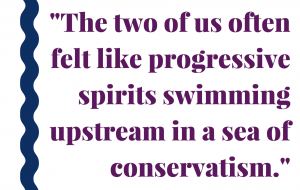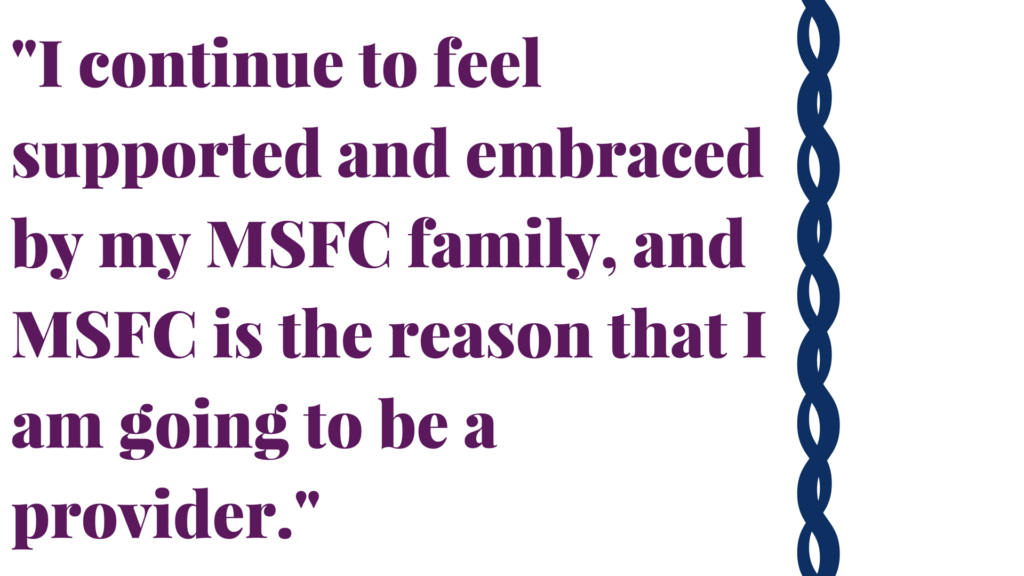By Christina Bourne
Being pro-choice has always been natural to me. I grew up in a pro-choice family, had an abortion as a teenager, and never felt anything but support from my community. I seldom thought about the right to choose. Sure, I knew there was debate around the issue, but I never felt a strong need to engage. I just assumed that we lived in a country where the right to have an abortion was and would continue to be a reality.
My assumption was challenged in 2012 when I started medical school in Wichita, Kansas, and it became clear to me that not everyone was pro-choice. I quickly bonded with a fellow medical student, Claire Thomas (on the right). The two of us often felt like progressive spirits swimming upstream in a sea of conservatism. We had each other, and sought to build community around issues we were passionate about.
When Claire and I realized that our campus didn’t have a chapter of Medical Students for Choice, we made it our mission to start one. But it wasn’t as easy as we had hoped. At the time, Wichita physicians still felt the aftermath of the 2009 murder of Dr. George Tiller – a local abortion provider and community leader. It took us two whole years of asking before we finally found a willing faculty advisor for our MSFC chapter – a requirement to form any student group.
 Claire and I were so excited to have our “official” group on the books…only we had no idea where to start. During my spring break, I called the MSFC headquarters, hoping to get some direction. It was such a breath of fresh air. I talked with the Manager of Student Organizing for over an hour about the anti-choice state I lived in (Kansas), how long it had taken us to get a chapter started (two years), and what training we had received about abortion care and management (little to none). Besides my conversations with Claire, I truly felt heard and understood for the first time.
Claire and I were so excited to have our “official” group on the books…only we had no idea where to start. During my spring break, I called the MSFC headquarters, hoping to get some direction. It was such a breath of fresh air. I talked with the Manager of Student Organizing for over an hour about the anti-choice state I lived in (Kansas), how long it had taken us to get a chapter started (two years), and what training we had received about abortion care and management (little to none). Besides my conversations with Claire, I truly felt heard and understood for the first time.
Facing adversity was not new for MSFC headquarters staff, and they knew exactly how to help get my chapter up and off the ground. I smile as I look back on that phone call because it was the moment that ignited our group. At the end of the call, I already had resources in my inbox, a welcome packet sent to my home address, and a plan for our first school meeting.
Since that day, our group has been one of the most active student organizations on campus. To date, we have held lectures on birth control, an MVA training workshop, an IUD training workshop, a vasectomy lecture, an ethics discussion, planned and hosted a transgender healthcare panel, participated in community canvassing, and helped plan a women’s health fair. We have partnered with Wichita’s Planned Parenthood and our local women’s health clinic which provides full spectrum healthcare. We printed and sold MSFC shirts and had an e-fundraiser to send two of our chapter members to MSFC’s annual conference. And last year, Claire and I attended MSFC’s Abortion Training Institute where we were able to unload, connect and network with our peers and current abortion providers.
The main reason our chapter has been so active is because of the awesome staff at MSFC. They understand the hectic schedules of medical students and provide power points, educational handouts, video tutorials and all the supplies needed to host educational events. Staff are extremely easy to get ahold of and quickly answer any questions that allow us to effortlessly put together these events. Words cannot express how deeply supported we have felt these past two years.
Without our MSFC chapter, abortion would rarely be discussed on the KU-Wichita medical campus. It has simply not been a part of our curriculum. Moreover, a year ago, a new chapter of Medical Students for Life was created on our campus. I like to think that this would not have happened if our chapter of MSFC was not as active.
Our MSFC chapter has brought a vital forum for balanced discussion on issues surrounding women’s health to our campus. Just last month we held an event which covered birth control and medical abortion, and we discussed current legislative restrictions and TRAP laws. First year medical students expressed surprise – they said they hadn’t been aware of the extent of Kansas’s restrictive policies towards women’s health. Later, they personally thanked us for generating this discussion. We also got a few new members.
I want to give a giant shout out to everyone at MSFC and specifically to the providers I have worked with along the way that have helped me build my medical and ethical foundation. I continue to feel supported and embraced by my MSFC family, and MSFC is the reason that I am going to be a provider. I am about to start my residency in Family Medicine and Psychiatry at UC Davis, where abortion training is integral to the curriculum and spirit of the program. Claire, meanwhile, will be moving to Fort Worth, TX to keep fighting the good fight as a Family Medicine Resident and future abortion provider at John Peter Smith Hospital. Our bond continues to grow, strengthened by our experience as MSFC co-presidents. We can’t wait to continue working with MSFC as MDs, during residency and beyond!

